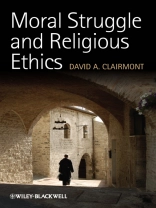Moral Struggle and Religious Ethics offers a comparative
discussion of the challenges of living a moral religious life. This
is illustrated with a study of two key thinkers, Bonaventure and
Buddhaghosa, who influenced the development of moral thinking in
Christianity and Buddhism respectively.
* Provides an important and original contribution to the
comparative study and practice of religious ethics
* Moves away from a comparison of theories by discussing the
shared human problem of moral weakness
* Offers an fresh approach with a comparison of the understanding
of the problem of moral weakness between the two key thinkers,
Bonaventure and Buddhaghosa
* Written by a highly respected academic in the dynamic and
fast-growing field of comparative religious ethics
Table of Content
List of Figures.
Acknowledgments.
List of Abbreviations.
Introduction.
Part I Questions and Contexts.
1 Person as Classic: Questions, Limits, and Religious
Motivations.
Persons, Limits, and Religious Classics.
Classics: questions and limits in thought and action.
Religious ethics: interpreting limited persons.
The model of person as classic.
Classic Persons: Ideas, Practices, and Questions.
Bonaventure as mediator of classic ideas and practices.
Buddhaghosa as mediator of classic ideas and practices.
Moral struggle as classic question.
2 Context: The Symbolic Religious Cosmologies of Roman
Catholicism and Therava-da Buddhism.
Moral Struggle in Greek, Roman, and Christian Philosophy.
Weakness of will and volition in classical philosophy.
Law, love, and wisdom in Christian scriptures.
Love, sin, and self-examination in Patristic theology.
Natural law and rational appetite in medieval theology.
Moral Struggle in Indian and Buddhist Philosophy.
Universal dharma and individual dharma in the
Vedas and epics.
Self and world in the Upanis.ads.
Moral perfection in the Buddhist Nika-yas.
The Symbolic Religious Cosmology of the Trinity.
Trinitarian doctrine.
Trinitarian symbolism.
Trinitarian exemplarity.
The Symbolic Religious Cosmology of Buddhist Abhidhamma.
Constitution of persons: aggregates, characteristics, and
ultimate realities.
The nature of reality and the structure of causality.
Intention, volition, and personal continuity in Buddhist
Abhidhamma.
Abhidhamma and Trinity as Comparative Contexts and
Categories.
3 Context: Material Simplicity in Christian and Buddhist
Life.
Historical Introduction to Material Simplicity.
Poverty and avarice in Bonaventure’s Europe.
Simplicity and sponsorship in Buddhaghosa’s Ceylon.
Bonaventure on Material Simplicity.
Material sufficiency in institutional life.
Voluntary poverty in individual life.
Buddhaghosa on Material Simplicity.
Wealth, giving, and the sacrifice of purification.
On the twofold nature of materiality.
Material Simplicity and the Problem of Moral Struggle.
Part II Ideas, Practices, and Persons.
4 Bonaventure and Buddhaghosa: From Ideas to
Practices.
Bonaventure’s Continuity with Medieval Debates on the Nature of
Will.
Buddhaghosa’s Manual of Practical Abhidhamma.
Bonaventure on the Connection Between Sacrament and Virtue.
Buddhaghosa on the Connection Between Morality and
Meditation.
5 Bonaventure and Buddhaghosa: From Practices to
Persons.
Bonaventure on Prayer.
Buddhaghosa on Meditation.
Bonaventure on Moral Exemplars.
Buddhaghosa on Moral Exemplars.
Comparing Persons in the Process of Struggle: Two Notions of
Person as Classic.
6 Personal Horizons: Moral Struggle, Religious Humility, and
the Possibility of a Comparative Theological Ethics.
Bonaventure and Buddhaghosa on Personal Struggle.
Comparative Theology and Comparative Ethics: A
Religious-Interpretive Work.
The Methodological Struggles of Comparative Persons: Five Roads
of Return.
Struggles for a Comparative Horizon: Religious Humility and the
Problem of Conversion.
Appendix: Some Common Buddhist Lists, Their Relation, and Their
Significance in Abhidhamma.
Bibliography.
Index.
About the author
David A. Clairmont is Assistant Professor in the Department of Theology at the University of Notre Dame. He is the co-author of American Religions and the Family: How Faith Traditions Cope With Modernization and Democracy (2007).







![Cover of Brian Schrag & Julisa Rowe: Community Arts for God's Purposes [Chinese] 貼近神心意的社群藝術 Cover of Brian Schrag & Julisa Rowe: Community Arts for God's Purposes [Chinese] 貼近神心意的社群藝術](https://static.worldofdigitals.com/thumb_webp/740/9781645083740.webp)




